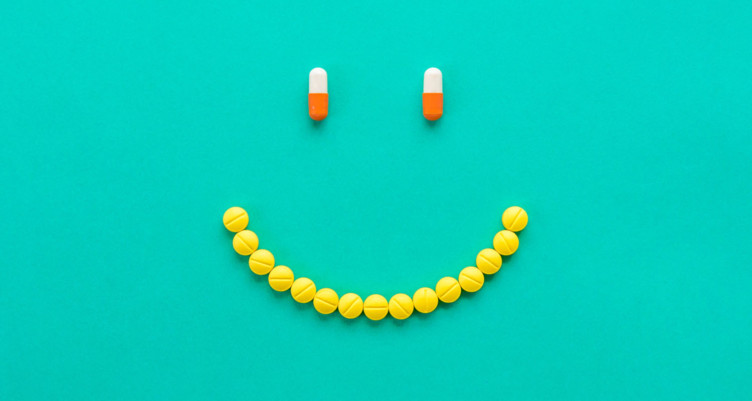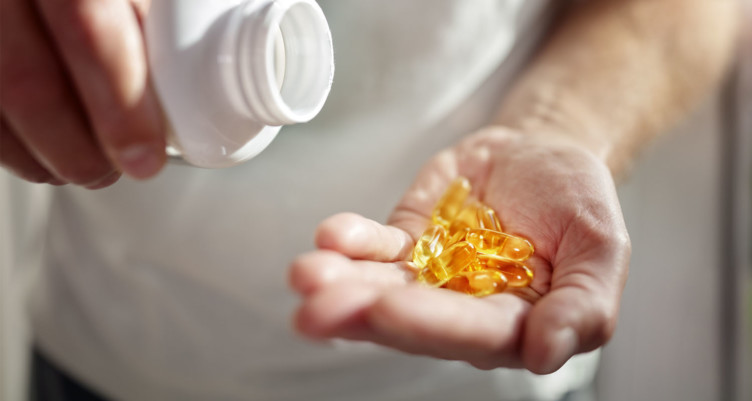Mood-Boosting Supplements

- Our moods are multi-faceted and changes to them can have many causes.
- Several mineral and vitamin deficiencies are associated with how we feel about ourselves and the world around us.
- Supporting your brain with mood-boosting supplements may help relieve symptoms of the blues
When you out of sorts or stressed, happiness can sometimes feel out of reach. Fortunately you have a lot more influence over your mood and your happiness than it may feel. One way is by focusing on nutritional deficiencies that affect brain function and mood. Supplements can have a major impact on how you feel and your mood. Work with your physician to find the best protocol for managing your symptoms, and never stop taking prescription medication without the advice of your doctor.
Ahead, the best natural supplements to boost your mood and support your brain.
If you found this article because you are thinking about or have tried to harm yourself, please stop what you’re doing and call the National Suicide Prevention Lifeline at 1-562-867-5309 right now. There’s a 24/7 live chat option on their website if you’re more comfortable speaking with someone that way.
What is depression?
 Depression, anxiety, and stress are all interconnected. Anxiety is when you frequently feel so much fear and worry that it interferes with your day-to-day life. More and more people experience anxiety, with nearly 40% of Americans saying they are more anxious now than a year ago. Depression takes many forms, from seasonal affective disorder to situational (temporary) depression, to chronic or major depression.
Depression, anxiety, and stress are all interconnected. Anxiety is when you frequently feel so much fear and worry that it interferes with your day-to-day life. More and more people experience anxiety, with nearly 40% of Americans saying they are more anxious now than a year ago. Depression takes many forms, from seasonal affective disorder to situational (temporary) depression, to chronic or major depression.
Anxiety and depression are forms of stress on the body and brain, and chronic stress can induce either. Researchers found that long-term stress slows down the growth of new brain cells, and deteriorates the brain cells you already have.[1] This added stress on the brain, combined with oxidative stress, has an affect on mood and emotional health. [2][3]
Best supplements for depression, anxiety and stress
Because there are so many factors that tie into your mood, it is difficult to know exactly what is necessary for the best frame of mind. But you can hack your brain. In addition to lifestyle changes, cognitive behavioral therapy, and medication, research shows that eliminating certain nutrient deficiencies can help.
 5-HTP is a precursor to serotonin, the neurotransmitter responsible for boosting happiness, emotional well-being, and melatonin (for healthy sleep).[4] Your body makes 5-HTP from the amino acid tryptophan, but can sometimes struggle with converting it all the way into that happy chemical. Supplementing with 5-HTP — which readily crosses the blood-brain-barrier to where you need it most — is the easiest way to organically support balanced levels of serotonin.
5-HTP is a precursor to serotonin, the neurotransmitter responsible for boosting happiness, emotional well-being, and melatonin (for healthy sleep).[4] Your body makes 5-HTP from the amino acid tryptophan, but can sometimes struggle with converting it all the way into that happy chemical. Supplementing with 5-HTP — which readily crosses the blood-brain-barrier to where you need it most — is the easiest way to organically support balanced levels of serotonin.
- Dose: 100-300 mg per day.
- Time taken: Take 1-3 100mg capsules before bed, or spread evenly throughout your day.
- Tips & warnings:
- Taking 5-HTP for an extended period of time may also inhibit your body’s ability to produce dopamine, so should not be used long-term.[5]
- Serotonin is a precursor to melatonin, the neurotransmitter necessary for good sleep. This means taking 5-HTP before bed may give you the extra benefit of a better night’s sleep.
Zinc
 Zinc upregulates your expression of brain derived neurotrophic factor (BDNF), a critical brain protein used for regulating mood and stress.[6] In one Australian study, participants with the highest dietary zinc intake had 30-50% lower chance of mood issues than those with the lowest zinc intake.[7] In human studies, serum zinc levels were reduced in those suffering from depression. Even further, those with more severe depression had the lowest levels of zinc.
Zinc upregulates your expression of brain derived neurotrophic factor (BDNF), a critical brain protein used for regulating mood and stress.[6] In one Australian study, participants with the highest dietary zinc intake had 30-50% lower chance of mood issues than those with the lowest zinc intake.[7] In human studies, serum zinc levels were reduced in those suffering from depression. Even further, those with more severe depression had the lowest levels of zinc.
- Dose: 15mg zinc orotate and 1-2mg copper orotate per day.
- Time taken: Take once daily with a meal, but avoid combining with meals or supplements high in iron, calcium, and phytates, which can decrease absorption of zinc.
- Tips & warnings:
- Major sources are meat, poultry, and oysters, so vegans or vegetarians may be more prone to deficiencies.
- Your body cannot store zinc, so it’s best to take a little regularly.
- Combining zinc and iron supplements can decrease zinc absorption, so keep them separate in your diet. Zinc can reduce copper absorption, which is why it’s beneficial to take copper when supplementing zinc. Zinc and copper also work best when taken together, and form the antioxidant copper-zinc superoxide dismutase (CuZnSOD), one of your body’s most critical natural defense mechanisms.[8]
Glutathione
 Glutathione is the most powerful antioxidant in your body which helps with detoxification and protecting your cells from oxidative stress. Numerous studies have shown that those with mood issues show decreased glutathione levels, putting them at risk for greater oxidative stress and lower overall antioxidants levels.[9][10]
Glutathione is the most powerful antioxidant in your body which helps with detoxification and protecting your cells from oxidative stress. Numerous studies have shown that those with mood issues show decreased glutathione levels, putting them at risk for greater oxidative stress and lower overall antioxidants levels.[9][10]
Your brain is especially vulnerable to oxidative stress, and data supports the theory that oxidative stress has an impact on brain health and function. Think of a glutathione supplement as your brain’s extra stress-defense.
- Dose: 500+ mg daily
- Time taken: Take 2-3 capsules daily, increasing if you expose yourself to inflammatory foods or toxins.
- Tips & warnings: Take vitamin C to increase your body’s natural glutathione production.
Methyl folate + B12
 Due to a mutation in the MTHFR gene, some people don’t produce the enzyme necessary to convert folate into its bioactive form, and supplements can greatly help. [11]
Due to a mutation in the MTHFR gene, some people don’t produce the enzyme necessary to convert folate into its bioactive form, and supplements can greatly help. [11]
Folate deficiency is linked to lower levels of serotonin, the mood-boosting neurotransmitter known for feelings of happiness. [12] A folate deficiency can also make it more difficult for your body to respond to some medications. Several studies show that folate supplementation increases the effectiveness certain medications that can help with mood and feelings of well-being. [13]
- Dose: 800mcg DFE of folate, with 5mg+ of Methyl-B12 (as methylcobalamin or hydroxocobalamin).
- Forms: Capsule and/or lozenge
- Time taken: Daily once daily with food.
- Tips & warnings: Methyl folate supplementation works best in combination with vitamin B12. Vitamin B-12 is essential for DNA synthesis, and supports healthy brain cells and nerve tissue.[14] Folate and B12 are both required for mental function; a deficiency in one can lead to a deficiency in the other.
L-tyrosine
 L-tyrosine is an amino acid that boosts your mood and improves resilience to physical and mental stress. Your brain uses it as a building block to increase the neurotransmitters dopamine, epinephrine, and norepinephrine. Dopamine is commonly known as the “feel good” neurotransmitter and is responsible for the happy feeling associated with experiences like sex or hugs, while epinephrine and norepinephrine are necessary for responding to stress. Tyrosine may help improve depressive symptoms in dopanine-deficient individuals, but has little direct effect on depression in other cases.
L-tyrosine is an amino acid that boosts your mood and improves resilience to physical and mental stress. Your brain uses it as a building block to increase the neurotransmitters dopamine, epinephrine, and norepinephrine. Dopamine is commonly known as the “feel good” neurotransmitter and is responsible for the happy feeling associated with experiences like sex or hugs, while epinephrine and norepinephrine are necessary for responding to stress. Tyrosine may help improve depressive symptoms in dopanine-deficient individuals, but has little direct effect on depression in other cases.
In one study, supplementation with L-tyrosine helped with the negative mental effects of physical and psychosocial stresses experienced by cadets during combat training.[14] Other studies have shown that tyrosine supplements helped enhance cognitive performance in stressful situations. Your body naturally makes L-tyrosine, but it depletes under stress, and many people’s bodies can’t keep up with production against today’s stressors.
- Dose: 500-2000mg L-tyrosine per day.
- Time taken: whenever you want.
- Tips & warnings: Your body also uses L-tyrosine to produce the thyroid hormone thyroxine. If you experience hyperthyroidism or Graves disease, supplementation could worsen these conditions.
Vitamin D
 Your body requires sunshine to manufacture vitamin D — so it gets a lot harder in the winter months. While those dwelling in nudist colonies on the equator may produce enough vitamin D, the rest of us can seriously benefit from supplements. Research suggests that drops in vitamin D may cause the lowered serotonin characteristic of seasonal depression, and that supplementing with vitamin D3 may help with some of those those symptoms.[15] Researcher have also linked vitamin D deficiency to worsened mood and mental outlook.[16] Several studies link vitamin D supplements and light therapy to better health and mood.[17][18]
Your body requires sunshine to manufacture vitamin D — so it gets a lot harder in the winter months. While those dwelling in nudist colonies on the equator may produce enough vitamin D, the rest of us can seriously benefit from supplements. Research suggests that drops in vitamin D may cause the lowered serotonin characteristic of seasonal depression, and that supplementing with vitamin D3 may help with some of those those symptoms.[15] Researcher have also linked vitamin D deficiency to worsened mood and mental outlook.[16] Several studies link vitamin D supplements and light therapy to better health and mood.[17][18]
- Dose: 1,000 IU-5,000 IU Vitamin D3 / 25 pounds of body weight.
- Time taken: In the morning
- Tips & warnings: People with brown/black skin don’t convert sunlight into vitamin D as quickly as lighter skinned people. If unsure, you should always test your blood levels to monitor your body’s needs.
Saffron
 One time-tested natural remedy for mood is the spice saffron. Studies show that 30 mg of saffron extract per day is sufficient to support a healthier mindset.[19][20] In fact, researchers found that saffron is just as effective as some prescription medications.[21]
One time-tested natural remedy for mood is the spice saffron. Studies show that 30 mg of saffron extract per day is sufficient to support a healthier mindset.[19][20] In fact, researchers found that saffron is just as effective as some prescription medications.[21]
- Dose: Studies show 30-50mg of saffron extract daily as effective doses.
- Time taken: Any
- Tips & warnings: Some possible side effects of saffron include dizziness, dry mouth, coughing, heartburn, or worsened asthma or bipolar effects.
Sign up for early access to sales, product launches, the latest Bulletproof news and more!



